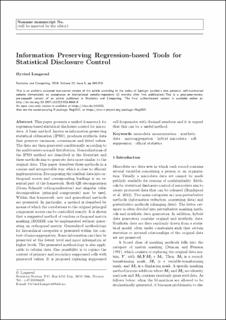Information preserving regression-based tools for statistical disclosure control
Peer reviewed, Journal article
Accepted version
Permanent lenke
https://hdl.handle.net/11250/2648071Utgivelsesdato
2019-01Metadata
Vis full innførselSamlinger
- Artikler / Journal articles [426]
- Publikasjoner fra Cristin [138]
Sammendrag
This paper presents a unified framework for regression-based statistical disclosure control for microdata. A basic method, known as information preserving statistical obfuscation (IPSO), produces synthetic data that preserve variances, covariances and fitted values. The data are then generated conditionally according to the multivariate normal distribution. Generalizations of the IPSO method are described in the literature, and these methods aim to generate data more similar to the original data. This paper describes these methods in a concise and interpretable way, which is close to efficient implementation. Decomposing the residual data into orthogonal scores and corresponding loadings is an essential part of the framework. Both QR decomposition (Gram–Schmidt orthogonalization) and singular value decomposition (principal components) may be used. Within this framework, new and generalized methods are presented. In particular, a method is described by means of which the correlations to the original principal component scores can be controlled exactly. It is shown that a suggested method of random orthogonal matrix masking can be implemented without generating an orthogonal matrix. Generalized methodology for hierarchical categories is presented within the context of microaggregation. Some information can then be preserved at the lowest level and more information at higher levels. The presented methodology is also applicable to tabular data. One possibility is to replace the content of primary and secondary suppressed cells with generated values. It is proposed replacing suppressed cell frequencies with decimal numbers, and it is argued that this can be a useful method.

